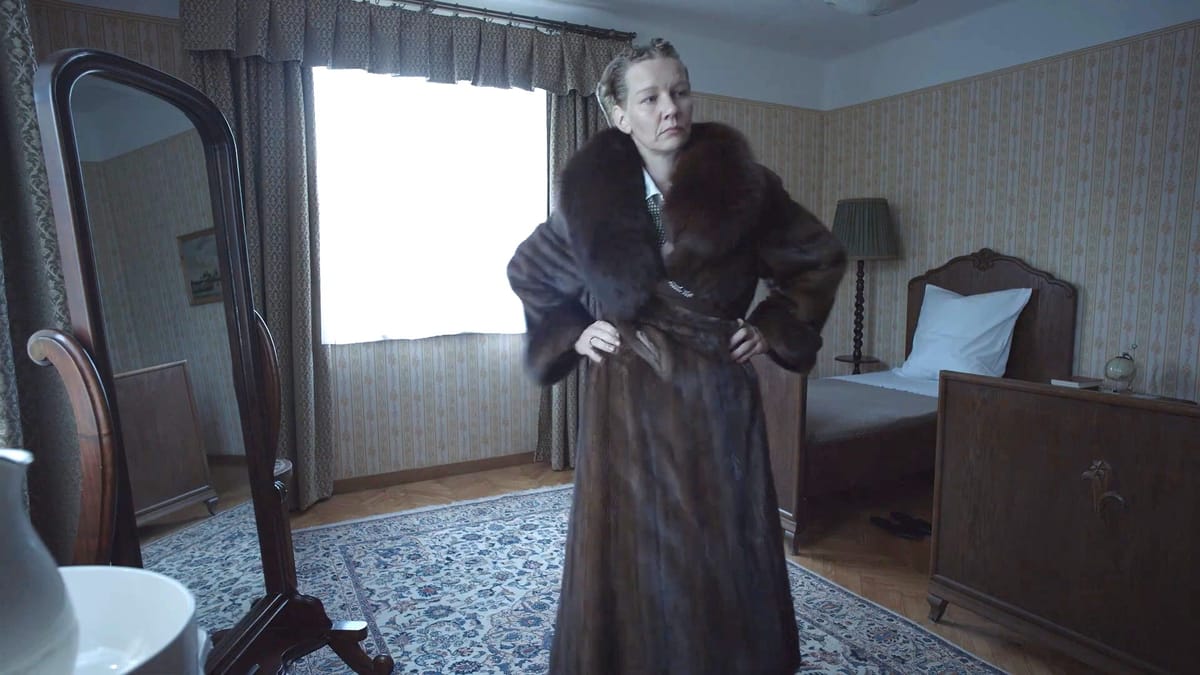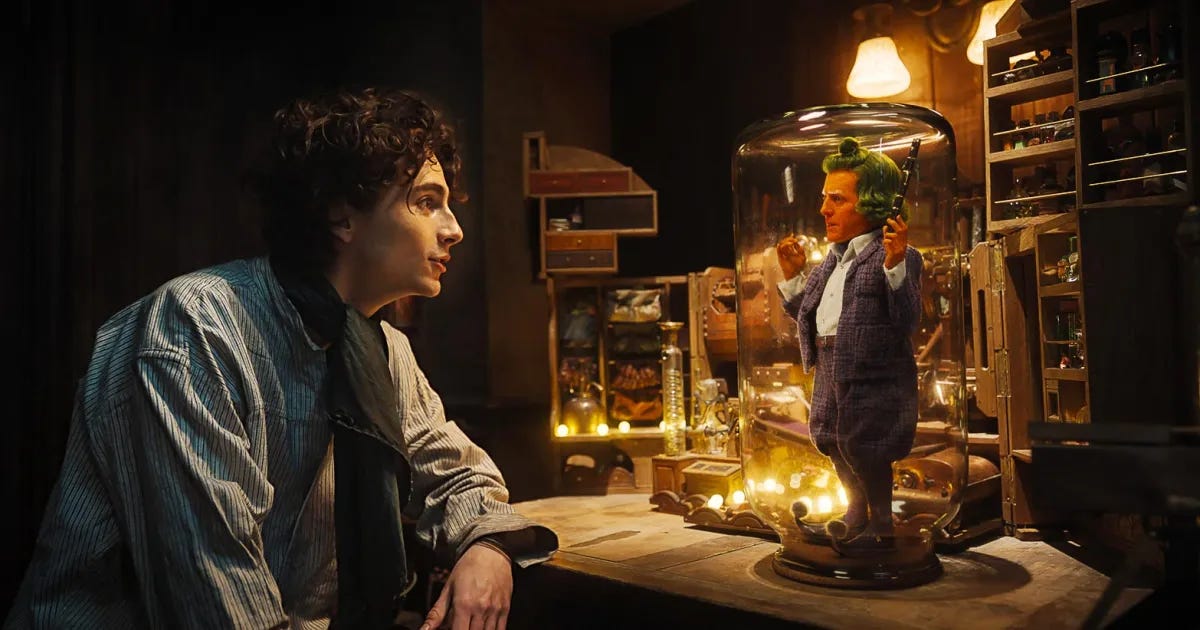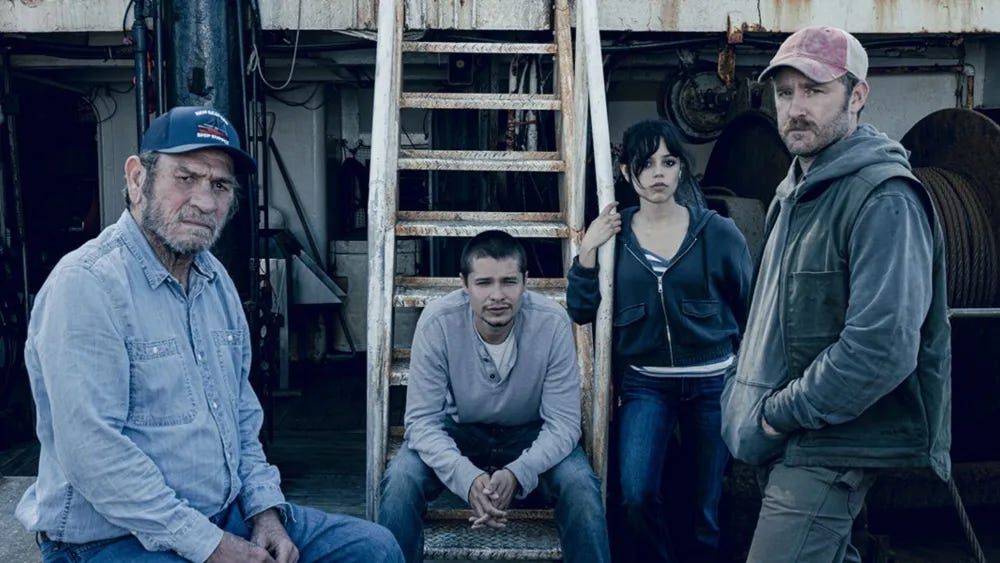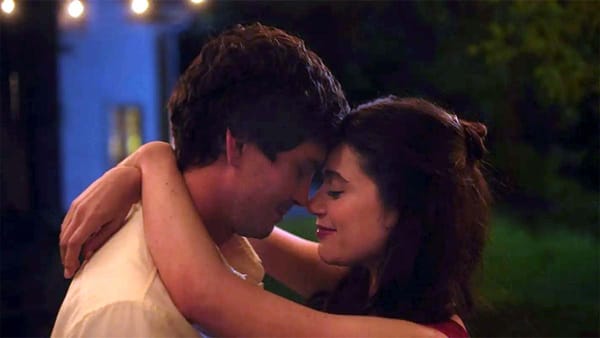What To Watch: Five for the Weekend
Reviews of "Wonka," "The Zone of Interest," "Monster," "American Fiction," and "Finestkind."

A round-up of four new films in theaters and one on VOD.

“The Zone of Interest” (⭐ ⭐ ⭐ ⭐, in theaters) As a director, Jonathan Glazer has a short but brutally brilliant filmography: “Sexy Beast” (2000), “Birth” (2004), “Under The Skin” (2013), and now his unforgiving adaptation of the 2014 Martin Amis novel about a German family living just outside the walls of Auschwitz in 1943. Father (Christian Friedel as Rudolf Höss) is the death camp’s commandant, while Mother (Sandra Hüller, above) cares for the couple’s five children while nonchalantly taking her pick of the furs, dresses, and jewelry that arrive over the wall from the Jews she and we never see (other than those picked to be the household servants). It’s a film of small domestic upsets and trivialities – the father facing relocation to Berlin to oversee all of Hitler’s death camp administration is as close as we come to a plot development – set against irrefutable evidence: Screams and gunshots heard in the near distance, plumes of smoke against the sky, ashes settling upon the laundry lines. “Zone” is a cruel but necessary experience and one of the great movies of the year — “Meet Me in St. Louis” with live ammunition and bodies stacked up just outside the frame. And in its testifying to the willful blindness of the bourgeoisie, their focusing on creature comforts so as not to see the blood on the floor and their hands, it is, of course, about all of us and everything we choose not to see. The Palme d’Or winner at this year’s Cannes Film Festival and already topping end-of-year critics’ lists, it’s if anything more urgent now than it was at the start of 2023.

“Wonka” (⭐ ⭐ ⭐, in theaters) – From the sublimely horrifying to the enjoyably ridiculous. This unasked-for origin story turns out to be sweet and weird, mostly in good ways. It stars Timothée Chalamet (above left) as the young Willy Wonka and is directed by Paul King, who gave us the “Paddington” movies. Those are pure of heart, funny, inventive, and never simpering, and “Wonka” has a similar lack of irony that is almost shocking in a popular culture where everything is measured on the Beaufort Snark scale. And Timmy can sing! And dance! Sort of. With a quavery enthusiasm that is appropriate to the role of a young choco-preneur who is clearly somewhere on the spectrum. The movie reminded me more than anything of the White Elephant musicals of my childhood in the late 1960s – bloated but oddly entertaining affairs put out by the great studios in their dying spasms. “Oliver!” (1968) – a cheery, toe-tapping family singalong about starving orphans and whores being beaten to death. “Mary Poppins” (1964) – A gaslighting nanny from over the rainbow. “Doctor Dolittle” (1967) – Rex Harrison singing like an asthmatic grackle while riding a plus-sized escargot.
“Wonka” is just as garish and, in places, as forced, but it also has the courage of its absurdity in a way that recommends it to young children and their attendant families. There’s nothing here as nightmarish as the Tunnel of Terror sequence in the 1971 “Willy Wonka and the Chocolate Factory” – along with Roald Dahl’s original “Charlie and the Chocolate Factory” the chief touchstone for what has unavoidably become a corporate franchise – and Timothée Chalamet intentionally sidesteps the shades of darkness that buoy Gene Wilder’s Willy Wonka. Unlike Johnny Depp in the 2005 Tim Burton remake, Chalamet doesn’t treat the role as a stunt but rather an excuse to locate and find an emotional base in a damaged yet optimistic young man. He commits, and that committal is the chief source of the movie’s charm.
Other qualified pleasures in “Wonka” include a wee, digitized Hugh Grant (above right) as an officious Oompa-Loompa, Keegan-Michael Key as a slowly ballooning policeman, an odd but possibly pointed sub-plot about human trafficking, and Olivia Colman overacting with every bit of classically trained spittle in her as Miss Hannigan Mrs. Scrubitt. Also: Rowan Atkinson reprising a choice bit of Mr. Bean dialogue and getting chased by a giraffe. Against all that is an overly linear script that feels written by committee and which thus avoids the nonsense that enlivens truly great chaildren’s stories, on the page or on the screen. You can hear Roald Dahl rolling in his grave, but gently, gently.

“American Fiction” (⭐ ⭐ ⭐ 1/2, in theaters) -- Highly recommended, even with an ending that doesn’t stick the landing. Here’s what I said when I saw the film in Toronto in September: A wicked social satire of race, literature, and the craving for bogus “authenticity” that manages to be both broad and sharp and that gives a plum role to the great Jeffrey Wright (above right) as Thelonious “Monk” Ellison, a persnickety novelist outraged by the popularity of “Black trauma porn” with white readers and really steamed that his own new manuscript isn’t deemed “Black enough” by publishers. So he writes a fake ‘hood novel called “My Pafology” – it later gets changed to something more, uh, direct – and despairs as a bidding war erupts. First-time film director Cord Jefferson shows his TV drama roots but manages to negotiate a devilishly tricky mixture of tones by keeping the comedy grounded while honoring the tragic moments without letting them swamp the ship. A good ensemble cast helps: Sterling K. Brown, hilarious and painful as Monk’s dyspeptic brother; Tracee Ellis Ross as his sister; Leslie Uggams as a mother sliding into dementia; Issa Rae as a rival writer; and Erika Alexander (above left), warm and wise as the hero’s new romantic interest. Based on Percival Everett’s 2001 novel “Erasure,” with dialogue that crackles and bites. Biggest problem: a meta-ending that doesn’t quite work. It’s a great movie to see with an audience, but you’re forgiven for wondering whether a largely white Toronto crowd laughing so freely at being skewered is a sign of the film’s success or possibly its failure.
I’ll only add that that last bit might apply as well to your local independent moviehouse experience. Still, Boston viewers will happy to see the beloved Brookline Booksmith receive a cameo. And I was remiss in not stressing that “American Fiction” is as much a drama about personal loss as it is a comedy about literature and is damn lucky to have a lead actor who can play both at the same time.

“Monster” (⭐ ⭐ 1/2, in theater) – Hirokazu Kore-eda is a busy filmmaker – 16 features in 28 years, half of them in the past decade – and there’s a case to be made that quality can take a back seat to quantity. “Shoplifters” (2018) was one of his best, most affecting dramas, and the one that brought him broader renown in this country, whereas “Monster” is a heartfelt, dramatically involving tale hampered by a programmatic structure. It begins with a young single mother (Sakura Andō, above right, the heart of “Shoplifters”) who, outraged that her son (Sōya Kurokawa, above left) may be being bullied by a schoolteacher (Eita Nagayama), goes up against a school bureaucracy overseen by a maddeningly unsympathetic principal (Yūko Tanaka). As the film moves forward, the audience is made to constantly redefine who the title “monster” may be – the teacher, the principal, the schoolboy, his classmate (the charmingly elfin Hinata Hiiragi) – as the story is replayed from different points of view. It’s a gambit as old as (and older than) “Rashomon,” but while the payoff is affecting, you feel the filmmakers’ hands on the tiller throughout. Your mileage may vary – “Monster” won the screenplay prize at Cannes in May, plus another award whose identity would count as a plot spoiler – but if you’re new to this prolific and deeply humane director, I’d suggest you start with “Shoplifters,” “Nobody Knows” (2004), “After The Storm” (2016), or “Broker” (2022). Additional note: The bruised and moody score is the last completed by the gifted rock star/composer/actor Ryuichi Sakamoto (“Merry Christmas, Mr. Lawrence”) before his death in March of this year; “Monster” is dedicated to him.

“Finestkind” (⭐ ⭐, streaming on Paramount+) – From my September Toronto festival posting: I have seen three movies at this year’s TIFF set in Massachusetts, and I am pleased to report that the current approach to The Accent is refreshingly sane: Either do it lightly or not at all. Erika Alexander in “American Fiction” wins the prize so far simply by pronouncing the town of Quincy correctly – “Quinzee” – and Tommy Lee Jones in “Finestkind” wins the Couldn’t Give a Shit Award by playing a grizzled New Bedford fisherman with his own Texas drawl, thereby forcing the screenwriters to come up with a convincing backstory for his character. The movie, I’m less pleased to report, is a well-intentioned mishmash of several different genres: A gritty working-class drama of family tensions, a surprisingly authentic docudrama of the New England fisheries, and, too late in the day, a crime drama with betrayals and backstabbings a-plenty and a villain played (quite well) by Clayne Crawford, who I guess is the Affleck you hire if you can’t hire an actual Affleck. Still, you have the always intense Ben Foster as the captain of a hard-luck fishing crew and Jones as his estranged father – every time either man is onscreen, you’re watching a real movie. But you also have a colorless Toby Wallace as the hero, Foster’s kid brother – headed to B.U. Law, don’t you know, but wanting to get his hands callused on a scallop boat first – and Jenna Ortega (TV’s “Wednesday”), who’s very likable but doesn’t yet have the emotional miles or acting skills to play a convincing New Bedford part-time heroin dealer. (But props to Rebecca Gilel as Ortega’s mother, who looks like she came to the set straight from a Fall River meth house.) The big oddity is a script that doesn’t know when to stop talking from writer-director Brian Helgeland, who won an Oscar for writing “L.A. Confidential” back in 1997.
Also: Martin Scorsese’s “Killers of the Flower Moon” is now available on demand at premium prices ($19.99 to rent, $24.99 to own) on Amazon, Apple TV, YouTube, and elsewhere. I like it very much and wrote it up here, but if I can offer a word of advice in absorbing this demanding and riveting three-and-a-half hour history lesson: Turn off the lights, shut off the phone, allow yourself an intermission, and lean in. Otherwise, you’re in for an “Irishman”-style disappointment: A failure not of a film but its audience.
Comments? Please don’t hesitate to weigh in.
If you enjoyed this edition of Ty Burr’s Watch List, feel free to pass it along to others.
If you’re not a paying subscriber and would like to sign up for additional postings and to join the discussions — or just help underwrite this enterprise, for which the author would be eternally grateful — here’s how.
You can give a paid Watch List gift subscription to your movie-mad friends —
Or refer friends to the Watch List and get credit for new subscribers. When you use the referral link below, or the “Share” button on any post, you'll:
- Get a 1 month comp for 3 referrals
- Get a 3 month comp for 5 referrals
- Get a 6 month comp for 25 referrals. Simply send the link in a text, email, or share it on social media with friends.
There’s a leaderboard where you can track your shares. To learn more, check out Substack’s FAQ.





